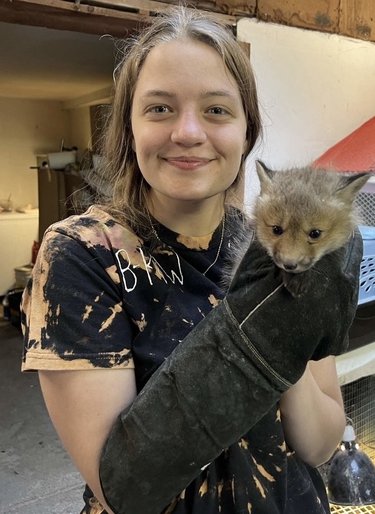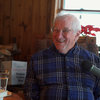Ashlyn Hanley learned from her Hilltown elders and wrote a book of their life stories
HILLTOWNS — Ashlyn Anne Hanley, who graduated in June from Berne-Knox-Westerlo, has put the life stories of nine Hilltown elders into a book she hopes kids at her school will read and learn from.
“There’s a lot of kids moving up to the Hilltowns that weren’t here before,” she says. “And I want them to know … how it’s changed.” She said of the stories in her book, “This may be like grandparents or great-grandparents of some of the kids because our community is so tight-knit up here.”
Her book is called, “Then and Now … Growing up a Hilltowner.”
Hanley, who was pursuing her Gold Award, Girl Scouts’ highest honor, was looking for something impactful and long-lasting that she could do for her Hilltown community.
“I talked to a bunch of people and history kept coming up …. That’s not something I know,” Hanley says in this week’s Enterprise podcast.
She then decided to record the life stories of old Hilltowners. Her requirement was that they be at least 70 years old and have lived their lives in the Hilltowns.
Hanley volunteered at the NEAT Dinner, which stands for Not Eating Alone Tonight, at the First Reformed Church of Berne “where a lot of elderly people in the community come and share a meal together.”
The church’s pastor, Robert Hoffman, helped her reach out to people in the beginning of 2020. Hanley envisioned visiting them in their homes, maybe sharing a meal, and recording their stories.
“People were thrilled to hear that their stories could be put in a book,” she recalled.
Then COVID hit.
“So I was stuck for months and months, probably nearly a year,” Hanley said. She then learned that Hoffman was doing church services through Zoom and he helped her reach people she could interview in the same way.
Her list was winnowed to four men and five women. She recorded their interviews and created, word for word, a narrative of each of their lives, discovering:
— As a child, Sandra Jeanne Quay had to clean her plate so, because she didn’t like cooked celery, she would stick it in the hollow aluminum leg of the kitchen table — only to be revealed when the table was moved to clean the floor. Later, as a Berne-Knox student, she played half-court basketball because girls, wearing one-piece gym outfits, were not allowed to cross over the center line;
— When Gerald Maynard Cross’s mother was about to give birth to him, Dr. Anna Perkins, on her way to the Cross home, got her car stuck in the snow and then walked the rest of the way to the house. He was class president, king of the prom, and started dating his wife in his junior year at Berne-Knox;
— Alan Peter Zuk is teased by his wife because, except for his college years, he has lived his entire life on the same road, now just a short way from the Berne dairy farm where he grew up. His father, in addition to farming, drove a school bus and Alan Zuk eventually became his father’s supervisor and now subs as a bus driver himself, having worked for the district a half-century;
— Growing up, Robert Marshall Stevens ate all three meals every day with his family and remembers at breakfast dunking his toast in coffee, like his father did; and, every once in a while, he’d get a sip of beer. He noted BKW has about the same number of students now as in the 1950s but twice the space. Without computers at all and no TV in the house until he was 12, he played hide and seek with friends in the summertime and tobogganed and skied in the wintertime;
— Linda Jean Panting Muller had a father who was a real cowboy and a mother whose parents had emigrated from Ukraine to New York City. She remembers being required to wear a dress to school and, in the winter, being allowed to wear slacks under her dress to keep warm but then having to take off the slacks once she got to school. The dress code loosened up in the sixties, she said;
— Alyce Patricia Stevens Gibbs came from a family that raised chickens so they had a lot of chicken dinners. Her father was a fisherman so they also had a lot of fish dinners and had yummy frog-like dinners over an outside fire. They also had a lot of venison because her dad hunted, too. A chore she hated was stretching washed curtains;
— The hardest choice Clark Willington Conklin had to make, he said, was volunteering to serve in Vietnam. He had joined the Navy right out of high school. He was told he couldn’t serve in Vietnam because he was in Summary and Service, a higher priority. “That was probably the luckiest day of my life,” he said, “because I was an engineman and enginemen go on what they call Swift Boats in Vietnam … and the mortality rate for an engineman on a Swift Boat was about 50/50”; and
— Maynard John Porter Jr. and Barbara Lee Filkins Porter told their life stories together because they have been with each other for most of their lives. In their youth, he had an Elvis look, he said, and she wore saddle shoes and poodle skirts — her mom made two for her. They both liked the fall community fair at Berne-Knox where she would hula-hoop in her poodle skirt. Her first married year, she was a senior in high school.
“I definitely found that by far the most common thing was their love of living up here and the community that we have up here because it’s very unlike any other,” Hanley said of the nine Hilltowners she interviewed.
Many of her subjects grew up on farms or worked on nearby farms. “Up here now, the younger kids are working in, like, local retail shops and stuff,” said Hanley.
She herself has a job off the Hill at Tractor Supply.
Many of the nine Hilltowns elders were wistful about the bygone way of life where agriculture dominated. They also missed how close-knot the community had once been before so many new people moved in, back when everyone knew everyone else.
Hanley donated a copy of her book, which she created through Amazon and is available through Amazon, to the Berne Library.
As a Scout, Hanley followed in her siblings’ footsteps: Both of her brothers — an environmentalist and a heavy-equipment operator — were Eagle Scouts and her sister, who plans to become a teacher, earned a Gold Award.
Hanley is forging her own career path. She will attend Cobleskill College in the fall to study wildlife management. She recently had an internship with wildlife rehabilitator Kelly Martin, which sealed her interest in the subject.
“After school, I would go and help her with the animals and I would learn about different illnesses and the correct diet they need, the correct housing they need … We worked with a bunch of different animals from porcupines, lots of different birds like vultures, red-tailed hawks, to pigeons and turtles.”
Hanley has passed the New York State exam to become a wildlife rehabilitator herself. The goal is to take in sick, injured, and orphaned wildlife, she said, and get them healthy enough to be released into their natural habitat.
She regrets there aren’t as many Scout troops as there used to be in the Hilltowns. Scouting gave Hanley her best friend and “amazing opportunities” like going whitewater rafting, she said.
From her experience interviewing Hilltown elders for her book, Hanley offers this advice to others, “If there’s members of your community that … are older, just give them an opportunity and have a conversation with them, learn a little bit about them.
“You’ll never know what you’ll learn — like Sandy put food in her table … I know a lot of them are grateful to even have the conversation.”
Hanley urged, “Reach out.”



